Is Late Night Dying? Fans Rally Behind Jimmy Kimmel and Stephen Colbert in New Survey
Late-night TV is under attack
ABC upset a lot of fans last week when it made the decision to pull Jimmy Kimmel Live! from the air. It did so after public pressure from Federal Communication Commission (FCC) chairman Brendan Carr, who was offended by comments Kimmel made about the Republican party in the wake of Charlie Kirk’s death.
Kimmel is now back on the air, but only in certain cities. This comes just a couple of months after CBS cancelled The Late Show with Stephen Colbert and After Midnight before that.
Is this the beginning of the end for late-night TV? We asked 500 Americans what they thought, and their answers surprised us.
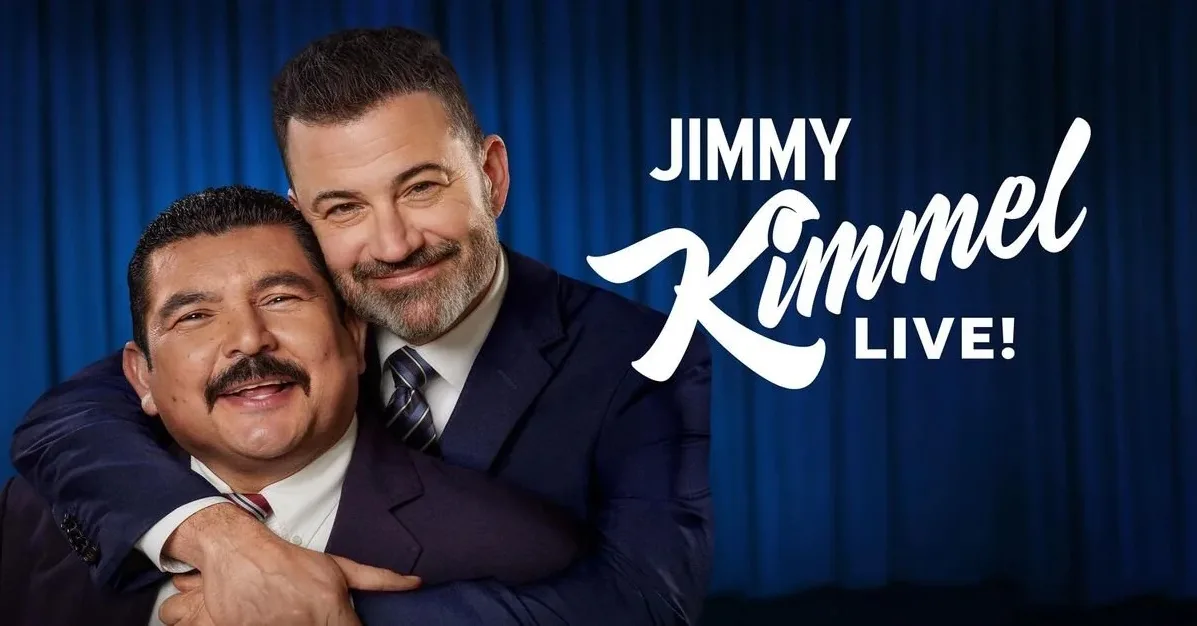
Looking for the hottest entertainment?
Subscribe to our email newsletter to get the latest TV premieres, entertaining takes, and money-saving promotions.
By signing up, you agree to our Privacy Policy & Terms and Conditions.
Broadcast companies are wrong about late night
Earlier in the year, when CBS cancelled After Midnight, Variety ran an article stating that the “business of [late-night TV] has been in decline.” This seems to be the mentality that executives are running with when they make the decision to cancel or preempt late-night shows. They even reported that NBC cut budgets for The Tonight Show Starring Jimmy Fallon and Late Night with Seth Meyers.
After CBS cancelled The Late Show with Stephen Colbert, Reuters called Colbert “the latest casualty of late-night TV’s fade-out.” CBS’s parent company, Paramount, claimed that the show was losing $40 million a year. Paramount also denied accusations that they canceled the show as retaliation for Colbert’s criticism of the company’s $16 million settlement with President Donald Trump.
How Americans watch late-night TV
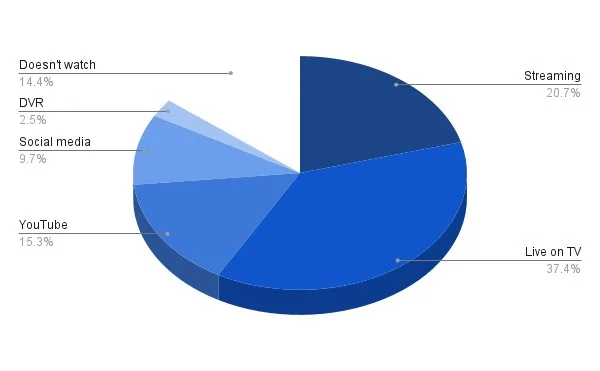
Despite Hollywood’s hesitancy, our survey found that 85.6% of Americans watch late-night TV. If broadcast companies can’t find a way to monetize that, it may be what the kids call a “skill issue.”
And for the majority of viewers, they’re not just watching clips on TikTok or YouTube. They’re sitting down and watching full episodes live on broadcast TV or later with on-demand streaming services. Live TV still accounts for 43.7% of all late-night viewers, and 37.4% of all survey participants.
Why Americans watch late-night TV
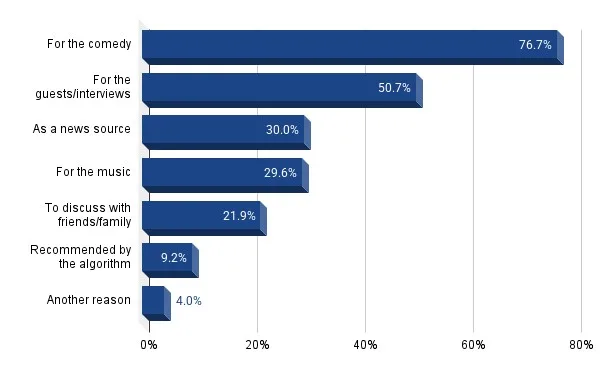
Of the participants who watch late-night TV, we found that 76.7% watch late-night TV for the comedy. That’s probably a given, but surprisingly, a little more than half of all late-night TV viewers are watching for specific guests and interviews. With late-night shows, these guest appearances can vary from the cast of the latest Marvel movie to political experts and government representatives.
Another surprise was that only 30% of people are watching late-night TV for news and current events. Late-night TV has always been a home to political commentary, regardless of which party is in office, and a lot of shows put a heavy emphasis on the news.
Something that should reassure broadcast companies, though, is that only 9.2% of viewers watch late-night shows due to a social media algorithm. With the growing influence of AI and social media, it may feel like creators have to appease some invisible entity to find success. But the vast majority of late-night viewers are making the conscious decision to participate.
Jimmy Kimmel Live! is one of late night’s most popular shows
According to our survey, 45.2% of Americans have watched Jimmy Kimmel Live! in the last year, making it the second most-watched late-night show of 2025. Saturday Night Live took the top spot, with 50.3% of Americans tuning in. Less than 10% of Americans watched CBS’s comedic game show After Midnight, which was cancelled after two seasons.
Late-night shows by viewership
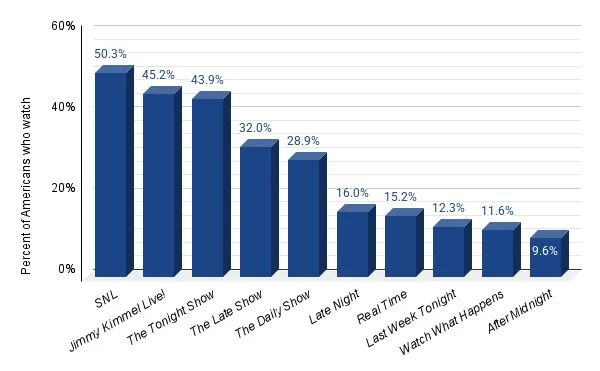
To be fair, we ran this survey days after Jimmy Kimmel’s suspension, so Jimmy Kimmel Live!’s stat could be inflated by people curious to watch the episode that got him in trouble.
But we also asked viewers what their favorite late-night show is. Unlike the last question, respondents could only pick one show. For this next part of the survey, we excluded the roughly 14% of respondents who said they don’t watch late-night TV.
America’s favorite late-night shows
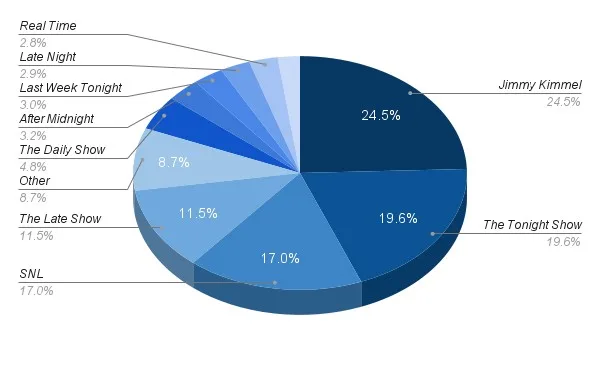
Once again, Jimmy Kimmel takes the biggest slice of the pie, with 24.5% of late-night viewers saying Jimmy Kimmel Live! is their favorite late-night show. The Tonight Show with Jimmy Fallon is the second-most-loved show, with Saturday Night Live coming in third.
8.7% of people responded that, even though they do watch late-night TV, their favorite show wasn’t on our list. If you’re saying “Hey, what about ____!”, this next section is for you.
America’s favorite late-night comedians
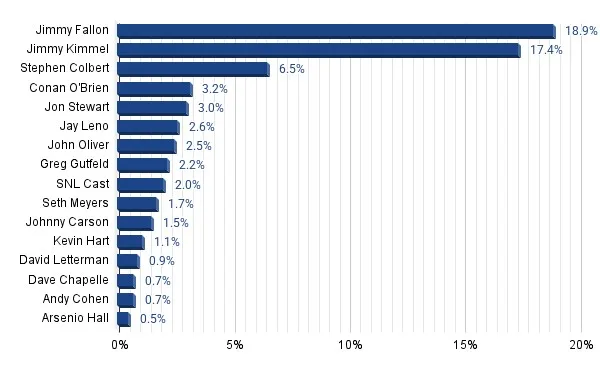
74% of Americans have a favorite late-night comedian. For this question, we brought all participants back into the conversation. We presented all 500 people with a free response box and let them answer: Who’s your favorite late-night comedian?
This time, Jimmy Fallon took first place over Kimmel, although to be fair, we had to disqualify a few respondents whose answers made it unclear which “Jimmy” they were supporting. In third place after the Jimmys is Stephen Colbert, whose Late Show was recently canceled by CBS. Several respondents named other former hosts, like David Letterman, Jay Leno, and Johnny Carson.
For the purposes of these survey results, we lumped all Saturday Night Live cast-member answers together. If you’re curious, some respondents specifically highlighted Kenan Thompson and Will Ferrell as their favorites.
Fans were not happy with Disney—and probably still aren’t
Given Jimmy Kimmel’s popularity with audiences, Disney probably should have anticipated a lot of public backlash.
After ABC announced its decision to preempt Jimmy Kimmel Live!, many fans boycotted Disney, ABC’s parent company, and canceled Disney+ subscriptions en masse. Both Disney+ and Hulu were already on unsteady ground with viewers—neither did very well in terms of overall satisfaction in our annual customer survey at the beginning of 2025. ABC responded to the mass boycotts by reinstating Kimmel’s show on Tuesday, September 23.
Unfortunately for Disney, this concession may not fully redeem its streaming services. The company just announced another price hike, bringing its standalone plans to $11.99–$18.99/mo. beginning October 21. That ad-free $18.99/mo. plan cost $6.99/mo. just five years ago. Disney’s other plans, including the popular Disney Bundle, will also see price increases. This price change won’t apply to Spectrum customers.
Disney+ prices 2019–2024

Disney has a history of pulling shows, but this is different
It’s not the first time a network has pulled the plug on a comedian for saying something controversial. ABC canceled Roseanne in 2018 after actress Roseanne Barr “ambien tweeted” racist remarks comparing a former Obama aide to an ape.
Roseanne was a sitcom, but late-night TV can be a more controversial medium just because it relies so heavily on a comedian voicing opinions. Audiences can choose to quit watching if a comedian goes too far. In our survey, 25% of people reported quitting or boycotting a late-night TV show. 35.7% of those respondents said they did so because they disagreed with the host’s views.
What made you quit watching a late-night show?
| Reason | Percent of late-night quitters |
|---|---|
| Disagreed with the host's views | 35.72% |
| Declined in quality | 16.43% |
| Change in host and/or cast | 14.96% |
| Inconvenient time slot | 11.73% |
| Too expensive to keep streaming or service plan | 11.43% |
| Disagreed with the network's views | 8.37% |
| Other | 1.38% |
However, unlike with Roseanne, Kimmel’s temporary suspension was not an independent decision from ABC or its parent company, Disney. Nor was it a grassroots movement from a wave of angry boycotting fans. Instead, it seems to have stemmed from direct pressure at the FCC.
This time, ABC pulled Jimmy Kimmel Live! over comments that he made live on the air. In his opening monologue on September 15, he criticized the Republican Party’s reaction to Charlie Kirk’s death. “We hit some new lows over the weekend with the MAGA gang desperately trying to characterize this kid who murdered Charlie Kirk as anything other than one of them,” he said, going on to say that they were “doing everything they can to score political points from it.”
After watching an interview where President Trump pivots from discussing Charlie Kirk to his new $200 million ballroom, Kimmel said, “This is not how an adult grieves the murder of someone he called a friend. This is how a four-year-old mourns a goldfish.” In another monologue that same week, Kimmel also criticized the Department of Justice for deleting its study that links political violence to white supremacy. ”Since 1990,” reported the 2024 DOJ study, “far-right extremists have committed far more ideologically motivated homicides than far-left or radical Islamist extremists.” As of writing, the link to this study still leads to an error message.
A lot of late-night hosts had been covering the fallout from Kirk’s murder, but it was Kimmel’s accusation that the right was “scoring political points” that offended FCC chairman Brendan Carr. During an interview on September 17, Carr claimed he had “a strong case for holding Kimmel, ABC, and network parent Disney accountable for spreading misinformation” and ominously added that they could do things “the easy way or the hard way.”
It was this pressure that led to Kimmel’s suspension at ABC.
Disney might not even have the final say
Disney bore the brunt of the criticism, but even the House of Mouse doesn’t have the power to bring Kimmel back to the masses.
Sinclair and Nexstar, broadcast companies that own a combined 66 ABC affiliate stations, continued to preempt Jimmy Kimmel Live! after ABC attempted to bring it back. Sinclair posted a statement on X promising “not to return Jimmy Kimmel Live! To air until we are confident that appropriate steps have been taken to uphold the standards expected of a national broadcast platform.” In that statement, Sinclair specifically cited FCC Chairman Carr’s threats as their inspiration.
It is unclear what standards Sinclair is referring to, or if the FCC’s involvement is a violation of the First Amendment. While the FCC does have some authority to regulate public broadcasting, it’s never reached this far. And other members of the government have threatened late-night hosts as well, including President Trump, who seemingly threatened legal action against ABC for airing “Democrat garbage.”
This all means that if you live in one of those 66 affected cities, including Washington, DC, Salt Lake City, UT, and Syracuse, NY, you weren’t able to watch Jimmy Kimmel’s return, well, live. Viewers in the affected areas could still watch his show on Hulu and clips on YouTube, but again, live TV makes up the largest slice of late-night TV’s viewership.
Earlier today, on September 26, Sinclair finally caved to pressure from “viewers, advertisers, and community leaders” and brought Jimmy Kimmel Live! back to the airwaves despite ABC not caving to many of its demands for apologies and political donations. Sinclair also changed its mind on whether it was influenced by the FCC, claiming that its decisions were “independent of any government interaction or influence.” Sinclair also admitted that its actions were “inconsistent” with “free speech.” As of writing, Nexstar has not yet followed suit.
What does the future look like?
82.9% of Americans say that late-night TV is still relevant in 2025. 33.26% of Americans say the format is shrinking, and 39.1% of Americans are expecting networks to launch new late-night shows to fill the gap created by cancellations.
Who would fill that gap? 26.9% of people would like to see up-and-coming comedians take the spotlight, and 7.7% of people would love to see more women and other underrepresented voices. With Taylor Tomlinson’s After Midnight off the air, The Daily Show’s Desi Lydic is currently the only female host in late night.
Respondents also suggested the names of established actors and comedians they’d like to see get their own show, including Kevin Hart, Jim Carrey, and Dwayne “The Rock” Johnson. Other people said they missed some of the old faces of late night, like Conan O’Brien, Trevor Noah, and Jay Leno. But the comedian with the greatest number of supporters in this question—which was a free-response question—was Jimmy Kimmel. We ran our survey before his show returned to the air.
Only 24.56% of people would switch to a competing late-night show if their favorite was cancelled, and 46.1% would just turn off the TV and not replace it with anything. So if broadcasters axe their own shows, they may struggle to retain their once-loyal viewers.
It’s very possible that the end of late-night TV could be the final push that some people need to fully switch from cable to streaming. That is, assuming the FCC gets its way and isn’t drowned out by boycotts from angry fans. We’ve already seen, through the Disney+ boycott and the Sinclair turnaround, that fans and advertisers want broadcast companies to stand up to political threats.
A shift to streaming, but a generational increase in interest
As entertainment journalists, we’ve been hearing about streaming services replacing cable TV for a while now. In fact, despite our brand name, we too watch a lot of streaming TV and cover streaming-related topics in our articles. But broadcasters are worried about what this shift could mean for late night; should they be focusing more on streaming and less on live TV?
How Gen Z watches late-night TV
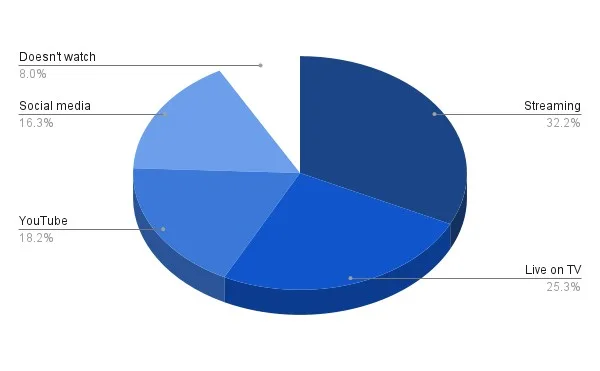
Earlier in our survey, we found that more late-night viewers watch shows live on their respective networks than any other way. However, we also pulled data from Gen Z specifically to see what the future holds. While 85.6% of general audiences watch late-night TV, that number jumps to 92% when you just focus on Gen Z. This seems to suggest that the future holds good things for the format. Whatever late-night shows are doing to attract young people, it’s working.
There’s one big difference between young people and general audiences, though: Gen Z is way more likely to watch their favorite late-night shows after the fact through on-demand streaming services.
This might actually be good for late-night shows. They might have to change the genre’s name if they can air at any time of day, but if things are trending towards on-demand streaming, they don’t have to worry about pressure from the FCC or broadcast groups like Sinclair and Nexstar.
Unfortunately, though, we haven’t quite reached that point yet. If late-night shows leave broadcast TV, they’ll still lose 37% of their viewer base. So for the time being, if broadcasters want to stay on the air, they’ll have to stand their ground.
Our methods
For this survey, we used Pollfish to ask 500 Americans aged 18 and above what they thought about late-night TV. Results were then stratified to account for gender and age range. When considering Gen Z-specific answers, we sectioned off respondents who marked their age as somewhere in the 18–28 range. This survey took place on September 19, 2025.
Your go-to experts for all things TV and streaming
Ever wonder what’s really going on in the TV industry? Here at CableTV.com, we do the heavy research to see how audiences feel and what they can expect from their favorite shows and networks. For more on who we are, check out our About Us page. For more on what we do, head over to How We Rank.

